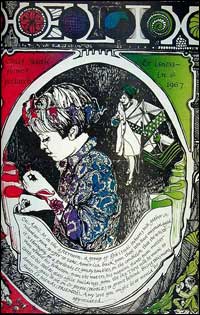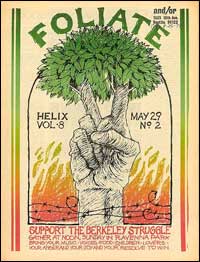Rites of passage: a memoir of the sixties in Seattle
Book Excerpt Rites of passage: a memoir of the sixties in Seattle
Sample Searches
- Vietnam protests--general
- Vietnam protests--human rights
- Vietnam protests--the draft
- Vietnam protests--anti corporate support
- Vietnam protests--anti government
- Vietnam protests-Laos
- Human rights--general
- Gay rights
- Feminism/Women's issues
- Racism
- Socialism/labor
- Farm workers
- Peace candidates
- Environment
- Religion
- Fanaticism
- Age of Aquarius
- Pro Vietnam War
- Other protests
- Civil Liberties
- Anarchy
- Palestinian protests
- Freedom of Speech
- Communism
The following text is excerpted from the book Rites of passage: a memoir of the sixties in Seattle, University of Washington Press, 1995. (pp. xi-xiii)
It's not hard to define "what" the Sixties were. Most can agree on the main ingredients: Vietnam and the explosion worldwide of wars for national liberation; civil rights and emergence of "black power" and other cultural-identity movements; rock and roll and the rise of a youth-directed market for culture and products in tempo with the adolescence of the Baby Boom; and drugs and a Dionysian "counterculture" devoted to preindustrial values of love, experience, and community.
(It may surprise some that I do not include the movements for women's liberation and environmental protection in the list above. It is not to disparage them or to deny the force they gained during the chronological Sixties, but they reached critical mass a little later-and the Seventies are so impoverished a decade that we should leave it some claim to fame.)
There are several dates on which one might start the Sixties clock. The technically correct date is January 1, 1961, since we count decades like fingers, from one to ten, not from ten to nine.
More than one commentator have suggested pushing that date back eleven months to the first Greensboro lunch counter sit-in on February 1, 1960. This marked the beginning of a new phase in the civil rights movement and led directly to the creation of one of the period's most important groups, the Student Non-Violent Coordinating Committee, yet SNCC's cause and style had roots going back at least as far as the 1955 Montgomery bus boycott.
An equally valid argument might turn the clock even further back to January 1, 1959, when fidel Castro drove Fulgencio Batista from Cuba in one of the first and most influential victories for a "national liberation movement." But the cause of independence from colonialism did not originate with Castro, and his own struggle dates back at least to 1953.
Many vote for the election of President John Kennedy on November 8, 1960, or his inauguration on January 20, 1961, or, more somberly, his death on November 22, 1963. The former dates did engender great hope and optimism, and Kennedy's assassination was the first shot in the fusillade of political violence which helped to define the decade.
Some argue for the Gulf of Tonkin incident and passage of the eponymous resolution in August 1964 as signaling a new phase in the war in Vietnam, but we were already being sucked into the swamp years earlier. And choosing this date leaves us with a decade nearly half finished before it "begins."
These are political coordinates, of course, and while this is chiefly a political book, the legitimacy of other coordinates must be acknowledged.
Foremost, there was the music. My friend Joe Vinikow, a music historian, argues that the Sixties began with the Beatles, and particularly their first American tour in February 1964. He believes this began to heal the ache from Kennedy's assassination, and no less than Jerry Garcia, of the Grateful Dead, agrees that "suddenly, it was a good flash."
The therapeutic aspects of the Beatles notwithstanding, clearly they brought an entirely new synthesis to the former American monopoly on rock and roll. But what of their predecessors on these shores, particularly Elvis Presley and Buddy Holly, who made a "black" music "white" and accessible even in Liverpool? And we should not forget the folk revival led by Joan Baez, Bob Dylan, and a host of singers who gave fresh voice to ancient lyrics of anguish and struggle and led a restless audience in new songs of alienation and rebellion.
Then there is literature. The poetry of the Beats became the mantras of the Hippies, yet most of the work was written in the fifties by men already graying in the Sixties. We should also not forget science, particularly the great race into orbit and to the moon, launched literally with Sputnik on October 4, 1957.
The baby boom may seem a unique Sixties phenomenon, but most members of the boom were born before 1957 and tempered by the culture of the fifties before reaching the magic decade. Similarly, the Sixties did not invent sex. The period's famous "sexual revolution" was more of a coincidence, thanks to the pill and penicillin. Contrary to conservative rhetoric, people were loving freely long before the Sixties made it relatively (and temporarily) safe.
Dating the end of the Sixties is equally difficult. As Abbie Hoffman commented, the Sixties ''were such a good decade, they stole two extra years." Perhaps even more. Many pinpoint the Kent State massacre of May 4, 1970, as the beginning of the end, but the largest demonstration against the war in Vietnam still lay a year in the future. A strong argument can be made for the presidential campaign of 1972, which closed one chapter with Senator McGovern's defeat and opened another with the Watergate burglaries.
The war in Vietnam offers at least two possible dates: completion of the American withdrawal in 1973, and the fall of Saigon in 1975, but accepting this would seem to deny the Seventies ownership of its own events and identity. In terms of music, art, culture, and social change there is no defined border between the decades. One could argue that the Sixties did not come to closure until one of its own moved into the White House, but the relentless harassment of Bill Clinton, House Speaker Newt Gingrich's sneering condemnation of "counterculture McGoverniks," and reaction to Robert McNamara's belated mea culpa on Vietnam suggest that the old generational battles are still being fought thirty years later.
The problem is that history does not come bundled up in neat decennial packages. Trying to impose arbitrary chronological brackets on any continuum of events is about as practical as wrapping soup in a newspaper: the contents spill out of both ends and spread everywhere.
It is easier to identify the middle of the Sixties: the May 1968 campus uprisings. This was the moment when "the revolution" became real for all sides, but there were as many personal revolutions as there were people in the Sixties.
The Sixties hit American culture like an atomic bomb. For each of us who was there, the consequences were different. Some were standing at the point of impact, some further away. Some were exposed, some shielded. Some were killed, some maimed, some merely wounded, and some emerged without a scratch.
Tens of millions of us were there when the Sixties struck. They happened to each of us at our appointed moment, a personal Hiroshima that seared the clock in our souls. We each know the time it hit.
That is when the Sixties were.



